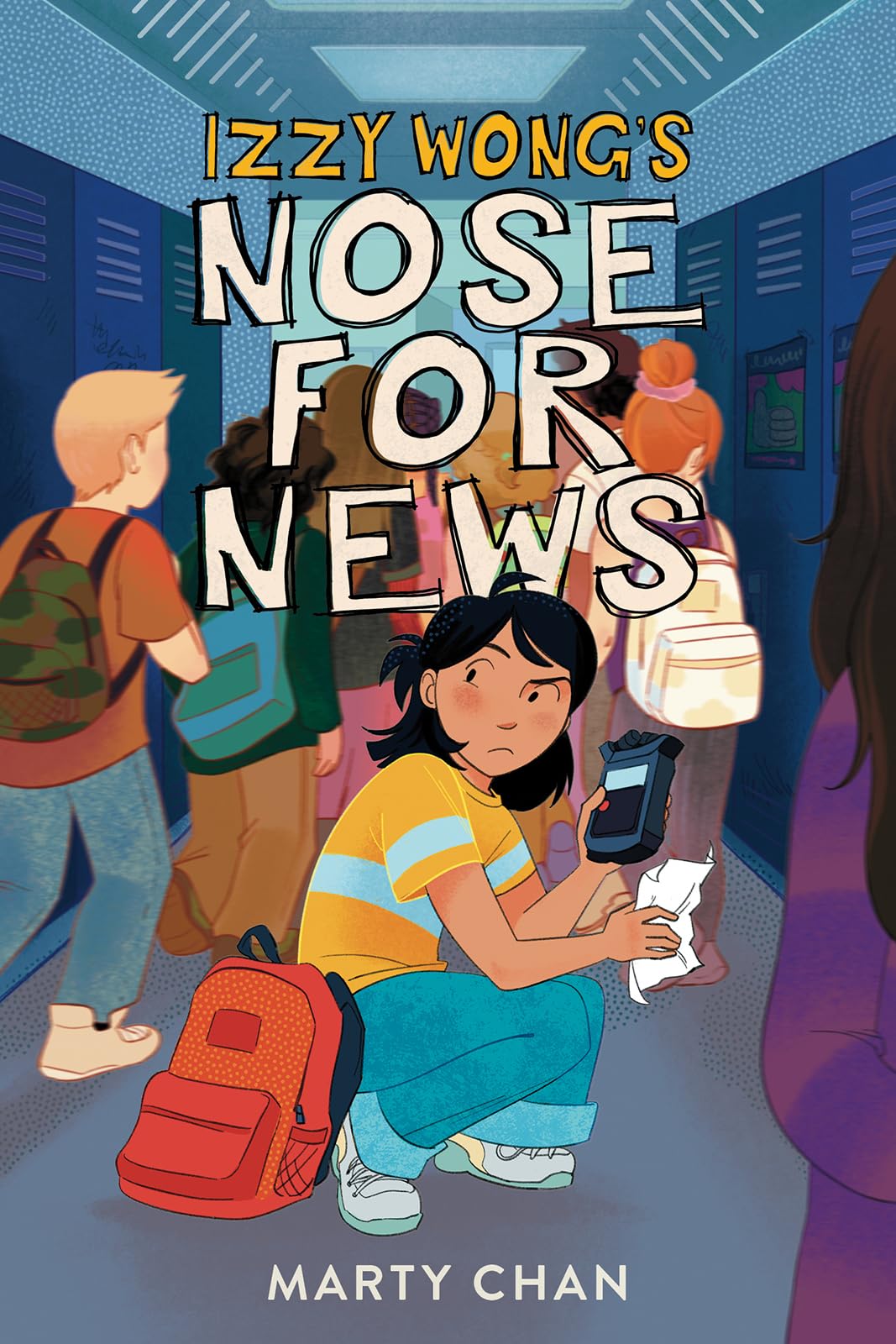Izzy Wong’s Nose for News

Izzy Wong’s Nose for News
I liked doing on-the-fly intros before my interviews, but I also needed an overall opener for the podcast. Mom said intros made the difference between a viewer watching the news or switching channels, so I had to make this script awesome. I put the finishing touches on the script and printed it off. Now to run it past my editor–Mom. I looked over the printed copy. Not bad.
Well, the good news for people who love to read is that the damage to the library wasn’t extensive, but it’s left me with one question. Who clogged the toilets? More important, why did they do it? Something smells, and it isn’t the wet carpet in the library. So if I am going to find out who flooded the girls’ bathroom, the question I have to answer is, Why did they do it?
Was it to wreck the library? Who doesn’t love books? Then there is the damage to Ms. Berenstein’s classroom. Is it possible that the target wasn’t the bathroom or the library but her classroom?
The only true way to find out is to have a chat with Ms. Berenstein. But you’ll have to wait for the next episode to find out what my former teacher knows.
You won’t believe what she says.
Not a word needed changing. I loved how the script read, and I was sure Mom would love it too, especially my last line.
It’s no surprise that Izzy Wong is a budding reporter. Her mother works for the local TV station and aspires to be an anchorperson. From her, Izzy has learned how to be curious and dogged, and, when clogged toilets in the girls’ washroom cause a flood at school, she senses a scoop. Because no one else seems to want to solve the mystery, Izzy starts interviewing and following her nose. She posts her findings to a new podcast and soon attracts quite a following. But is she reporting the story or getting sidetracked by the attention?
Lots of novels feature kids investigating crimes or mysteries, but Izzy is one of the first to do so via her own podcast. This makes the book feel innovative and relevant and highlights issues involved in kids’ using technology beyond ubiquitous handwringing about social media. Izzy has her own handheld digital recorder and knows how to edit and adjust audio. She also knows how to structure a podcast, following the lead of her heroine, Sarah Koenig, the host of Serial. From her, Izzy has learned that subjectivity can be as important as objectivity. Izzy knows the importance of facts over conjecture, but she becomes tempted to compromise her ethics in search of a good story. Chan attempts to include some of the layers and ethical questions that occur in Serial, including reporting the story in real time, inviting listeners on the journey, using suspense and cliffhangers, and Koenig’s inserting her own speculative questions into the podcast.
Of course, this novel is not as nuanced or complex as the famous podcast, but it does consider lots of meaningful grey areas. Izzy thinks back to an occasion when she reported on how students were chosen to read the morning announcements and then faced pushback from the administration. Her parents support her right to investigate and the freedom of the press, but Izzy hasn’t yet learned the importance of context and is surprised when her parents take her principal’s side later in the story. She will eventually learn the difference between rumors and news.
The pacing is great, and the story never lags. Izzy interviews her teachers and the librarian and then starts forming ideas about motive. She talks to the class bully/prankster and the girls who hang out in the bathroom. Each person leads her to a new clue as she searches for the perpetrator. When she finds a love note dropped on the ground, she uses it without permission and makes assumptions which turn out to be wrong. She becomes too involved in the story in a personal way—reporting for attention rather than facts. This leads to a moment of reckoning and questioning, similar to the narrative structures embedded in her favourite podcast, Serial.
It’s hard not to love Izzy, and her voice always rings true. She is smart, thoughtful, and a little eccentric. Her narrating the story draws readers into her very particular mindset. The structure of the novel, using first person perspective and actual excerpts from Izzy’s podcast and interviews, is also fun and appealing.
Izzy is kind of a loner, not necessarily by choice. Chan just hints at the difficulties of being a bit different, or following a demanding vocation like journalism. When Izzy discovers that her family has been considering a move to another city without consulting her, she is hurt but not that upset because she hopes she might find community at another school. She is not an outsider, but she has no real friends, a fate which can befall the overzealous reporter or one-track mind kid. This theme is subtle, but noteworthy.
The novel also hints at how kids are still often underestimated and dismissed; Izzy’s teacher and principal see her desire to report as simply an annoying distraction. Izzy probably does cross a few lines with how she uses school time, but it is telling that her school does not encourage her obvious talents. The novel encourages kids to follow their passion, even if it is not appreciated at school.
Izzy Wong’s Nose for News is a delightful middle grade novel about ethics in journalism and growing up.
Kris Rothstein is an editor, writer and former children’s book agent in Vancouver, British Columbia.
